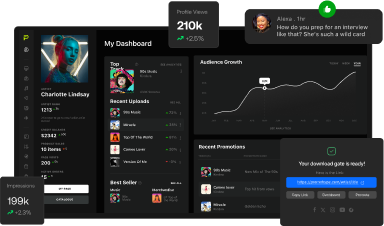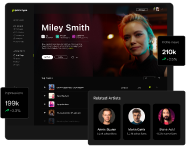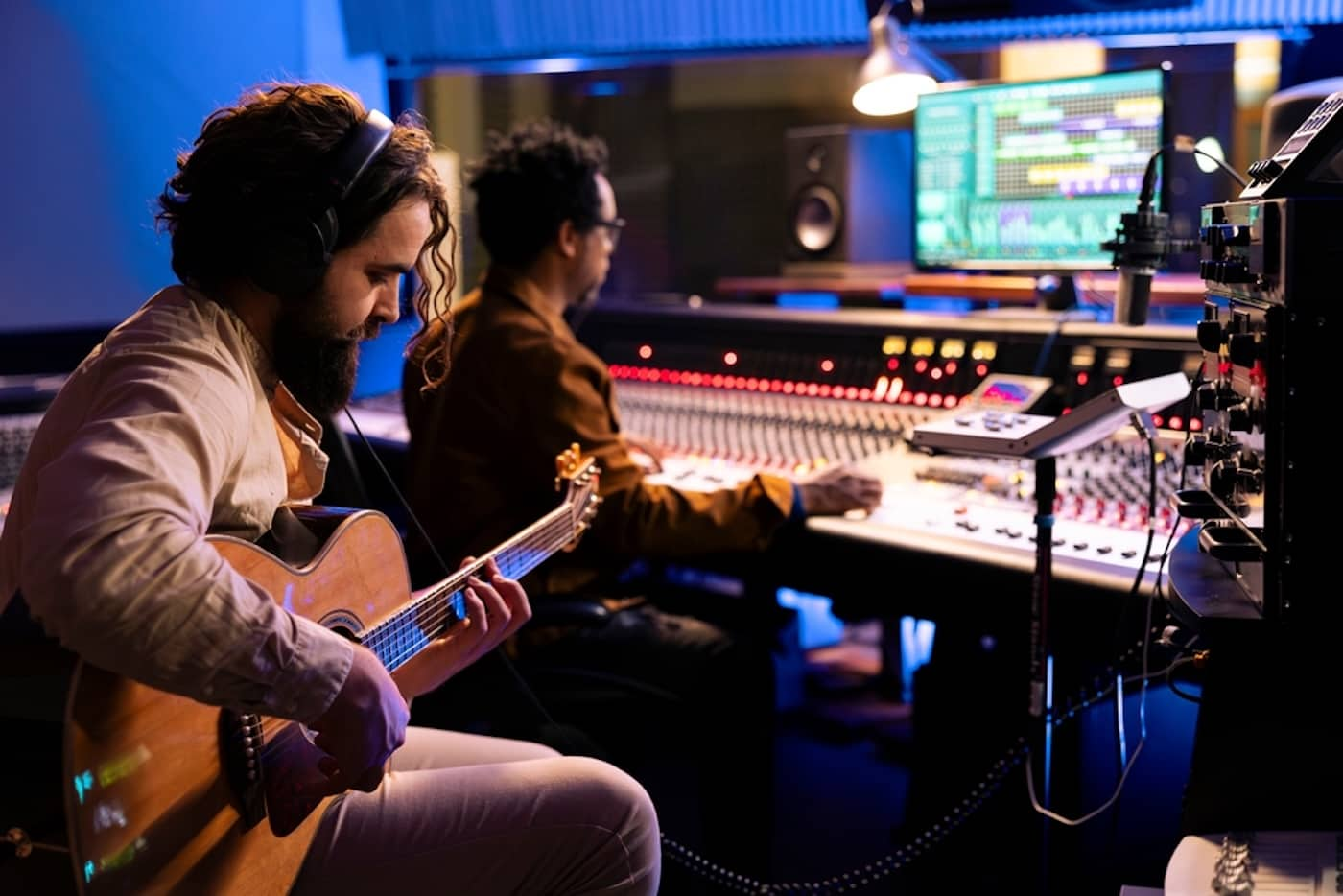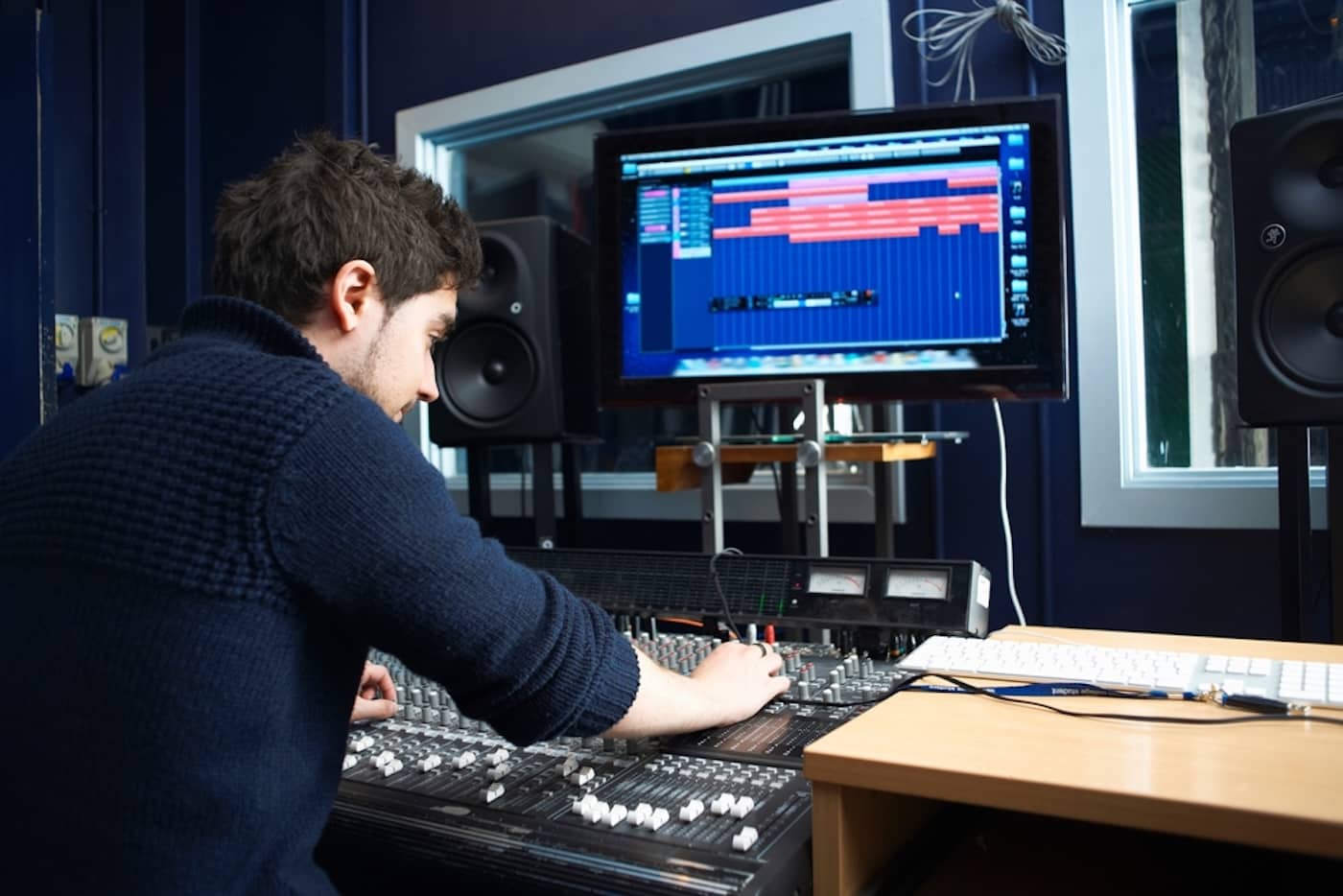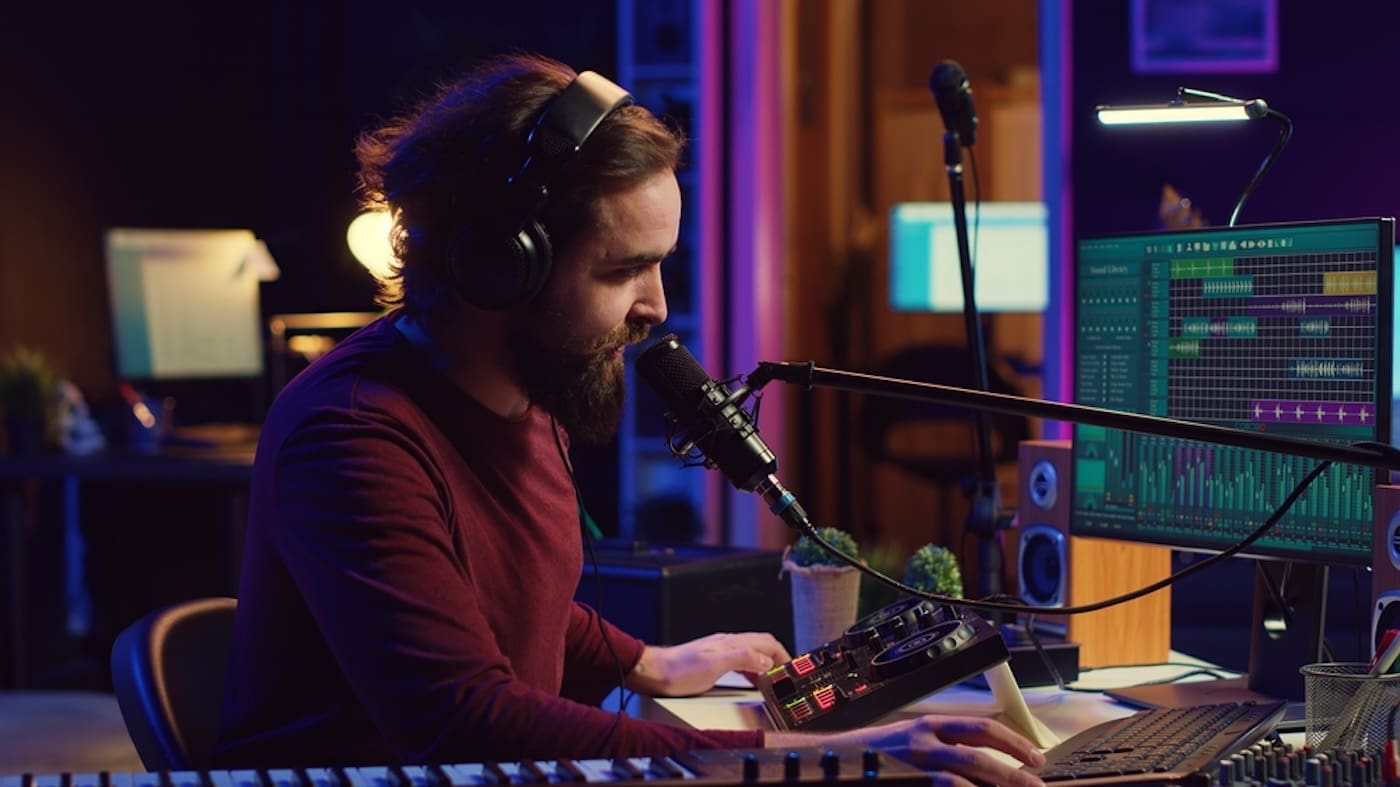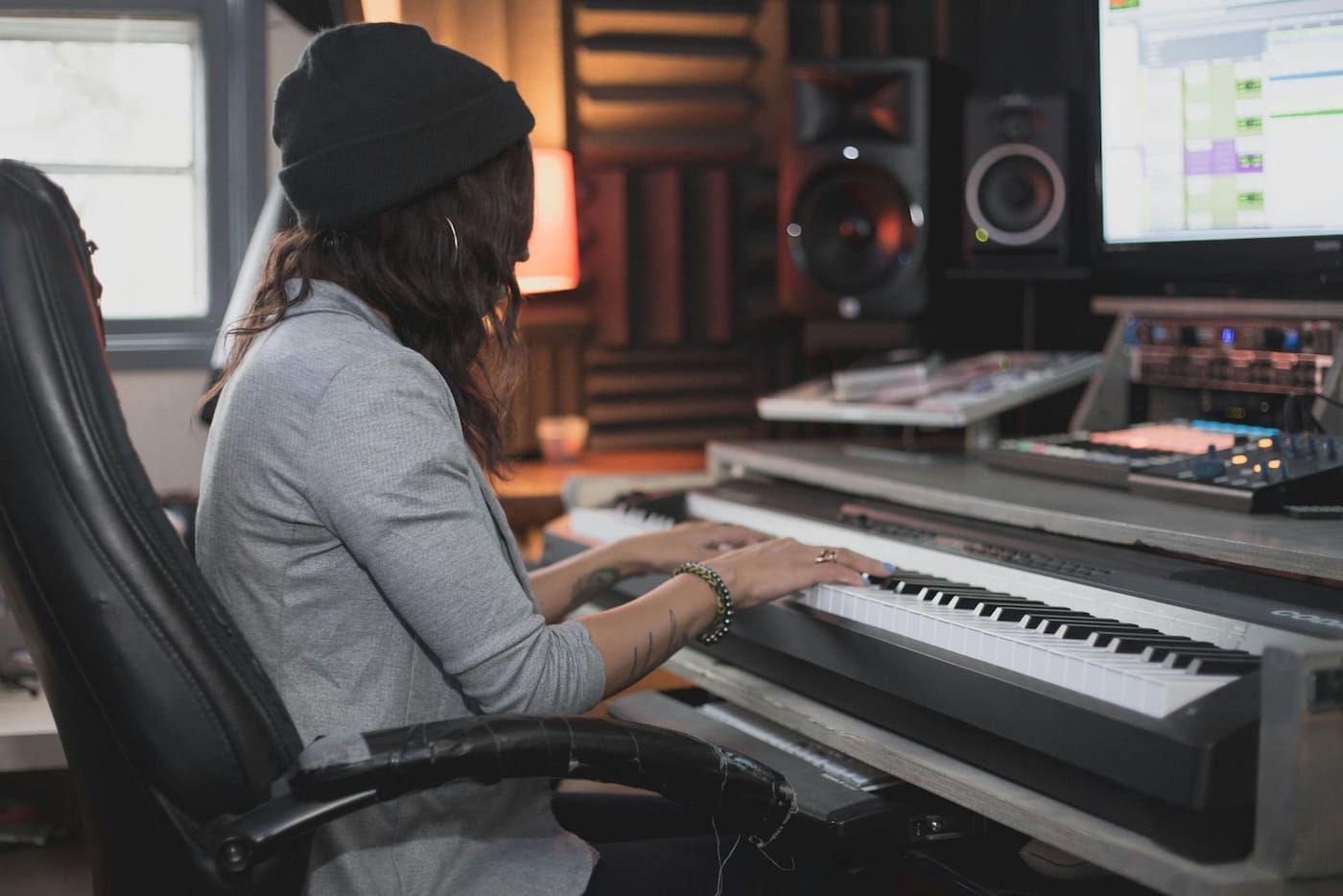
Starting with music production can be daunting, as it involves a variety of software, hardware, and production processes to learn.
These music production tips will help you to quickly master the basics, allowing you to focus on your creative flow.
Read on to discover how to streamline production through careful research and preparation to produce music with a professional sound.
Get Early Access
To Promo Hype
Top 10 Music Production Tips For Beginners In 2025
Whether you’re an aspiring EDM producer or looking to produce music for a band, the rules of production remain the same.
Here are the essential music production tips you need to transform musical ideas into great songs that impress your audience.
1. Learn The Basics Of Music Theory
One of the core requirements when writing a song is understanding music theory and how it informs the building blocks of song structure.
While a deep dive isn’t always necessary, some music theory for producers is required to provide the foundation for compositions.
If you’re creating minimal techno, a basic understanding of rhythm, harmony, and melody will nonetheless enhance your productions.
For producers working in genres with more emphasis on melodies, a grasp of this concept and various types of chords is essential.
Fortunately, beginner producers have numerous music theory resources available to them if the subject is entirely new.
Online reference guides, such as the circle of fifths, can help with arranging harmonies and chord progressions without costing money.
Many dedicated websites break down basic theory, streamlining the process of composing songs for different genres.
There are also music theory books for those who want to delve deeper and foster a more comprehensive musical development.
Understanding these concepts will make composition creation easier, speed up your workflow, and open up collaboration opportunities.
Reach a global audience with Promo Hype’s music distribution services.
2. Research Other Producers You Admire
Most people who decide to start music production do so after being inspired by established artists they admire.
This provides a strong foundation for early research, allowing for the absorption of the musical output of electronic music producers and bands.
The best music producers have extensive experience using the software and processes that beginners need to master.
By researching these producers, beginners can gather numerous music production tips that will streamline their workflow.
For example, many professional YouTube producer channels feature videos breaking down the audio production processes used for their releases.
This includes the hardware and other tools they use to ensure their music sounds good, and how their tracks are put together.
You can also attend clubs and live events hosted by other producers to see how their music sounds when scaled up for large venues.
Researching established producers is a tactic most successful independent artists use, offering deep insights into the music industry.
3. Create A Library Of Reference Tracks
Once you’ve created a list of other producers you admire, you can use this to create a comprehensive library of reference tracks.
These reference tracks should include examples of songs that use vocals, effects, and other instruments you’re considering using.
They can be powerful tools when learning how to make music, demonstrating song structure through intros, verses, and choruses.
If you’re a complete beginner, you can use these to directly copy a song’s structure to use as a template for a shallower learning curve.
Reference music is also crucial for matching volume levels, building arrangements in production software, and applying EQ and effects.
When building your reference library, aim to include tracks that use similar instruments and sit within your desired style or genre.
Try to use a lossless audio file format whenever possible, using commercially successful pop music with robust dynamic range.
4. Master Your Production Tools
Whether you’re using a free digital audio workstation (DAW) like Audacity or Pro Tools, mastering your gear is essential for producers.
The music production software market continues to expand, offering numerous options for new producers working on a tight budget.
Begin by exploring the software’s basic functions and learning how to import your own sounds into the user interface.
This will help you to build up a foundation of knowledge incrementally, from using the piano roll to create melodies to applying effects.
As your experience evolves, you can add new plugins and VSTs to apply to the same sounds and achieve different results.
Some producers prefer to use hardware instead of music production software, which typically has a steeper learning curve.
Most, however, opt to begin with DAW production, which is less challenging to master thanks to the proliferation of tutorials and courses.
5. Use Tutorials & Courses
On the subject of tutorials and courses, content is abundant online that will teach you how to produce music like a professional producer.
These tutorials cover a range of topics, from production tips specific to a particular genre to dedicated videos on various production techniques.
You can also find thousands of dedicated YouTube tutorials focused on specific DAWs and niche hardware producers.
If you’re struggling to achieve a particular lead sound, you can likely find free tutorials that break down the process in straightforward language.
Indeed, one of the advantages of the numerous tutorials online is the availability of varying processes used by producers.
For example, if you’re new to audio compression, you can find tutorials that apply it to vocals, drums, and across entire mixes.
This enables you to develop a comprehensive understanding of any given process or technique and create atmospheric sounds within your own mix.
If you’re willing to invest in your learning process, you can sign up for dedicated music production courses that offer in-depth lessons.
Such courses are broken down into easy-to-understand lessons or modules, making them accessible to beginners.
For those hoping to build a music career, attending a full-time music production school is a viable option.
While this option can be expensive, it provides access to high-level education and industry connections that can’t be found elsewhere.
Get Early Access
To Promo Hype
6. Understand Sound Design
Like song structure and composition, understanding sound design is a crucial element of music production that beginners must master.
Sound design is used to shape the sonic landscape of a song, elevating the original sound into something unique and new.
By mastering the associated techniques, you can explore broader creative options and deliver a depth and complexity on par with professionals.
While sound design varies between the most popular music genres, the core principles remain the same for all music producers.
Here’s a brief overview of some of the key characteristics of sound design and how it contributes to creating good music:
- Creating a full audio space: Great sound design fills up the sonic space of a track, using panning for instruments, gain staging techniques, and processes that enhance stereo width.
- Reshaping and sculpting audio: Designing sounds for music also involves reshaping audio samples and instruments across different tracks, from synth chords to vocals and drums.
- Creating moments of contrast: Excellent music has a sense of dynamic range that sound designers can utilize to enhance moments of contrast, resulting in punchy effects.
With technology emerging to deliver sound design freedom for producers, the art form continues to evolve in exciting new ways.
7. Learn Mixing & Mastering
Following the previous step is the broader process of mixing and mastering, which polishes and optimizes tracks for other sound systems.
Mixing revolves around balancing the individual instrument tracks of a song to deliver a cohesive result that sounds good.
This includes balancing levels to achieve the same volume regardless of your sound selection, whether using a sample library or original recordings.
One of the most common mixing tips from professionals is to work on mixing throughout production to save time making corrections.
On the other hand, mastering typically occurs in the final stage of production, refining the overall sound and mixdown.
While big-name artists hire a professional mastering engineer, there are more affordable alternatives available to the average person.
If you’re working in a home recording studio, investing in a decent pair of studio monitors is also essential for optimizing mastering.
This will ensure it doesn’t sound out of place on other sound systems, such as when played on phone speakers or car stereos.
You can recreate the mastering chain used by professionals in a DAW, combining EQ, compression, noise reduction, and other processes.
Discover more: Learn how to read sheet music.
8. Practice Making Music Regularly
As with all creative pursuits, becoming a music producer requires frequent practice, which includes making complete tracks.
One of the most common pitfalls new producers fall into is focusing on minor details at the expense of overall composition and production.
While dedicating a few hours to learning new plugins and processes can be beneficial, it can quickly take up days or weeks of your time.
To avoid this, beginner producers should aim to finish songs as regularly as possible to streamline the overall workflow.
Each new song can be used to iterate and apply new production techniques, refine song structure, and enhance mixing and mastering.
The more music you complete, the easier it will be to create cohesive sounds throughout the mix, making the track feel polished.
9. Experiment With New Techniques & Equipment
Once your production skills begin to develop, you can explore new techniques and start experimenting with new equipment.
While a DAW is a great tool for production, there’s a wealth of hardware, including drum machines, synthesizers, and sequencers, to explore.
Begin by examining the personal studio gear used by iconic music producers to see what they incorporate into their workflow.
If your collection of music production equipment includes microphones, you can record vocals and other original sounds in place of sample packs.
Experimentation is also excellent when collaborating with singers and other musicians who bring their experience to the table.
If you have the time, you can learn an instrument and use it to record original melodies or chords to add to your productions.
10. Gather Feedback & Refine Your Workflow
Lastly, gathering constructive feedback is crucial for evolving as a music producer and enhancing your overall skill set.
Feedback from more experienced producers will help you identify and resolve any production issues you may have encountered.
Likewise, constructive feedback from fans of your preferred music genre can also shed light on areas for improvement.
You can use this feedback to refine your overall production workflow, focusing on problem areas and the necessary techniques to fix them.
In general, your music production workflow should be subject to continuous improvement and adaptable to specific projects.
Showcase Your Music With Promo Hype
Once you’ve completed your productions, you’ll need to promote your music to the largest possible audience.
Promo Hype provides all the tools needed for independent artists to reach a global fan base across all major streaming platforms.
By signing up for a Promo Hype membership, music producers can access the following services:
- Instant distribution on all major streaming platforms: Reaching an international audience requires access to all major streaming platforms worldwide. With Promo Hype, members can distribute new releases on Spotify, Amazon Music, Apple Music, and TIDAL.
- Comprehensive marketing with a dedicated Promotional Toolkit: Whether promoting a new single or upcoming event, Promo Hype helps artists achieve their goals. By utilizing the Promotional Toolkit, you can streamline your marketing strategies and allocate your budget effectively.
- A lively community of like-minded artists and producers: If you’re struggling with music production or looking for collaborators, Promo Hype’s community is for you. This lively forum for like-minded artists provides a hub for networking and sharing tips.
With additional Promo Hype features, including powerful performance analytics, it’s the go-to platform for emerging independent artists.
Summary
Mastering music production techniques is crucial for creating professional-sounding tracks that meet industry standards.
By applying the music production tips in this guide, you can streamline your workflow and incorporate strategies used by your favorite artists.
As your production skills improve, you can explore new hardware and plugins that bring unique sounds to your music productions.
Get Early Access
To Promo Hype
Join Promo Hype
